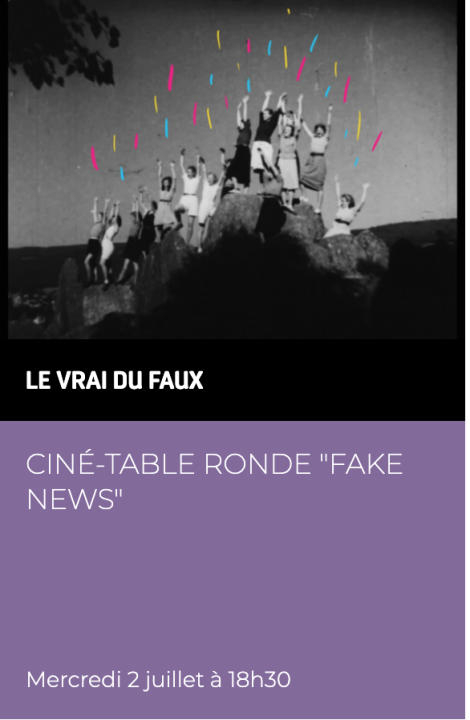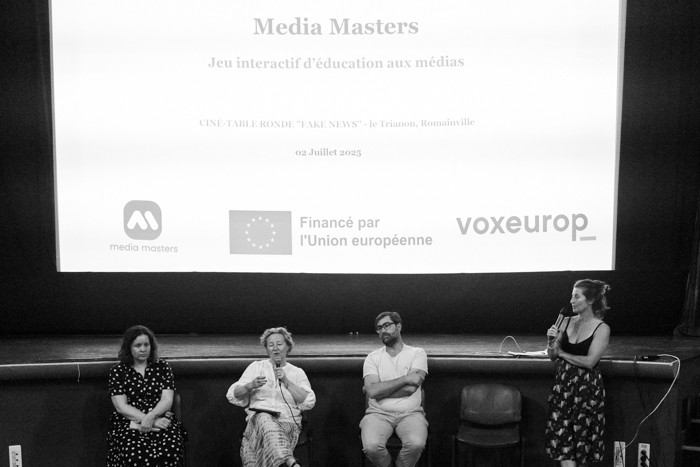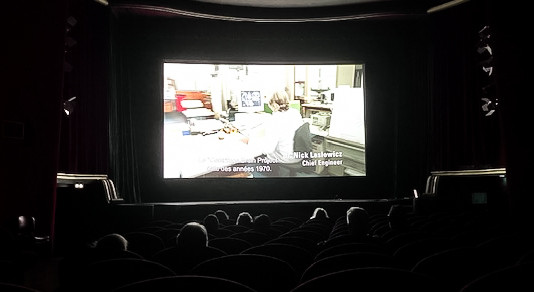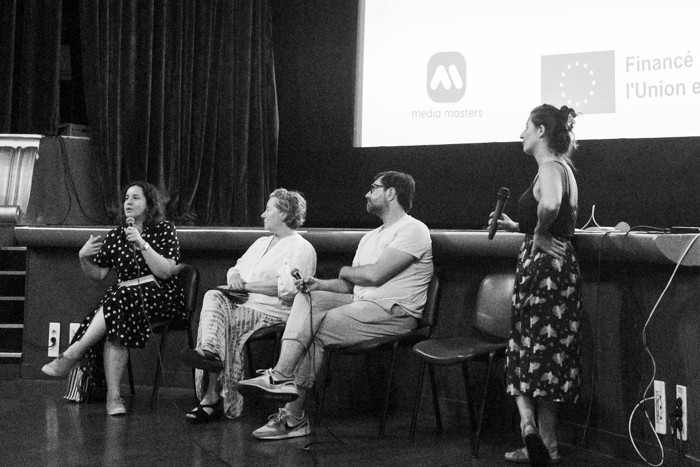‘When we organised this conference in partnership with Voxeurop, we hadn't anticipated the heatwave and the 29 degrees in the room... Thank you for braving the weather to come!’ These are the words chosen by Martine Scoupe, deputy director of Le Trianon, an art-house cinema renowned for its cultural programming in Romainville, near Paris, to introduce the evening's programme.
To fuel the discussion on false information and its impact on European democracies, four short films*, chosen by the Trianon team, were shown to look at the manipulation of images, and illustrate how editing and staging can shape different truths, or mislead viewers.
Not a single country on the old continent is spared from false information
‘Is Europe safe from fake news?’
This was the central question chosen by Delphine Bauer, journalist and member of the Youpress journalists collective who was in charge of chairing the round table, to launch the discussion.
For Catherine André of Voxeurop, the answer is no, given the recent example of the Romanian presidential elections of 2024, during which the electoral commission invalidated an initial ballot because of allegations of Russian interference. In fact, not a single country on the old continent has been spared. ‘But that just goes to show how important it is to cover the news on a European scale,’ she adds.
Fake news circulates six times faster than real news," explains Grégoire Pouget from Nothing2Hide, citing an MIT study. "This can be explained by the fact that fake news arouses strong primary emotions such as fear, anger and enthusiasm, and confirms our cognitive biases. What's more, we naturally tend to want to share what we find revolting. In his view, generative Artificial Intelligence (AI) and deepfakes (fake videos) are making visual and audio manipulation more accessible, and fuelling a widespread climate of mistrust.
And with the exponential speed of dissemination now possible on social networks, fake news can reach thousands or even millions of people in a matter of seconds.


Déconstruire les récits dominants grâce au journalisme
‘One of the main obstacles to investigative journalism is also the storytelling of major companies, institutions and governments’, says Leila Minano, a journalist with Investigate Europe, using the recent example of one of her investigations into the opening of a lithium mine by Imerys in the Allier region of France. "The real danger is not just viral fake news, but brilliant and misleading speeches by companies or governments. She quotes Imerys: ‘They say “we're going to drill cleanly in the Allier”... except that in reality, there's nothing clean about it!’
Investigative journalism is one of the essential tools for restoring transparency and accountability. But it is expensive and still underfunded. While, as Catherine André points out, France still has a few independent investigative media supported by their audiences, this is no longer necessarily the case elsewhere in Europe, whether in Poland, Hungary or Belarus, where the press is gradually being placed under the thumb of governments.
Despite the censorship and political control present in these countries, there is resistance, particularly through exiled newsrooms and citizens' initiatives.


Impact as a compass for independent journalism
The three speakers agreed on this point: investigative media and their investigations now have a tangible impact on politics, justice and society. It is no coincidence that, in their work and communications, these media are increasingly focused on this notion of impact, which is both a lever for demonstrating their usefulness and an incentive to continue in a difficult context.
One thing is clear: the fundamental role of a free and independent press, in France and throughout Europe. In an ecosystem saturated with manipulated content, opaque algorithms and disinformation on an industrial scale, journalism remains one of the last bulwarks of democracy. To play this role to the full, it must be financed, supported and protected.
The conference report is available here:
https://docs.google.com/document/d/1EahF_8QCeBbRlP21vgy454yE16MLozZ7/edit
*Liste des courts métrages diffusés:
- LE RÊVE DE BAILU de Nicolas Boone:
https://nicolasboone.net/le-reve-de-bailu/ - LES JOIES SAUVAGES de Aurélie Bonamy:
https://www.focusfilms.fr/catalogue/joies-sauvages/ - THE CENTRIFUGE BRAIN PROJECT de Till Nowak : https://www.youtube.com/watch?v=RVeHxUVkW4w
- LES DOCUMENTS INTERDITS : ROSWELL de Jean Teddy Filippe:
https://www.youtube.com/watch?v=Yzq3FBAHSmw